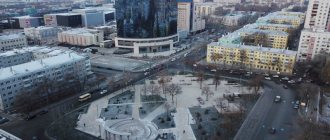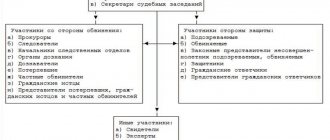Article 30 of the Code of Criminal Procedure of the Russian Federation. Composition of the court (current version)
1. Consideration of criminal cases is carried out by the court collectively or by a single judge. The composition of the court for the consideration of each criminal case is formed taking into account the workload and specialization of judges through the use of an automated information system. If it is impossible to use an automated information system in court, it is allowed to form the composition of the court in a different manner, excluding influence on its formation by persons interested in the outcome of the trial.
2. The court of first instance considers criminal cases in the following composition:
1) judge of a federal court of general jurisdiction - criminal cases of all crimes, with the exception of criminal cases specified in paragraphs 2 - 4 of this part;
2) a judge of the supreme court of the republic, a regional or regional court, a court of a federal city, a court of an autonomous region, a court of an autonomous district, a district (naval) military court and a panel of eight jurors - at the request of the accused, criminal cases for the crimes specified in paragraph 1 part three of article 31 of this Code, with the exception of criminal cases of crimes provided for in articles 131 part five, 132 part five, 134 part six, 212 part one, 275, 276, 278, 279, 280.2, 281 of the Criminal Code of the Russian Federation;
2.1) a judge of a district court, a garrison military court and a panel of six jurors - at the request of the accused, criminal cases of crimes provided for in Articles 105 part two, 228.1 part five, 229.1 part four, 277, 295, 317 and 357 of the Criminal Code of the Russian Federation, for which, as the most severe form of punishment, life imprisonment or the death penalty cannot be imposed in accordance with the provisions of part four of Article 66 and part four of Article 78 of the Criminal Code of the Russian Federation, criminal cases of crimes provided for in Articles 105 part one and 111 part four Criminal Code of the Russian Federation, with the exception of criminal cases of crimes committed by persons under the age of eighteen;
3) a panel of three judges of a federal court of general jurisdiction - criminal cases of crimes provided for in articles 205, 205.1, 205.2, 205.3, 205.4, 205.5, 206, 211 part four, 212 part one, 275, 276, 278, 279, 280.2, 281 parts two and three of the Criminal Code of the Russian Federation, and other criminal cases within the jurisdiction of the 1st Eastern District Military Court, the 2nd Western District Military Court, the Central District Military Court and the Southern District Military Court in accordance with paragraphs 2 - 4 of part six .1 Article 31 of this Code, and if there is a request from the accused, filed before the appointment of a court hearing in accordance with Article 231 of this Code - criminal cases of crimes provided for in Articles 105 part two, 126 part three, 131 parts three - five, 132 parts third - fifth, 134 parts fourth - sixth, 208 parts first, 209, 210 parts first, first.1, third and fourth, 210.1, 211 parts first - third, 227, 228.1 parts fifth, 229.1 parts fourth, 277, 281 parts first, 295, 317, 353 - 358, 359 parts one and two, 360 of the Criminal Code of the Russian Federation;
4) magistrate - criminal cases within his jurisdiction in accordance with part one of Article 31 of this Code.
3. Consideration of criminal cases on appeal is carried out:
1) in a district court - by a judge of the district court alone;
2) in the supreme court of the republic, regional or regional court, court of a federal city, court of an autonomous region, court of an autonomous district, district (naval) military court - by a court composed of three judges, with the exception of criminal cases of crimes of minor and medium gravity, and also criminal cases with appeals, submissions against interim decisions of a district court, garrison military court, which are considered by a judge of the supreme court of a republic, a regional or regional court, a court of a federal city, a court of an autonomous region, a court of an autonomous district, a district (naval) military court alone ;
3) in a court of appeal of general jurisdiction, a military court of appeal - by a court composed of three judges, with the exception of criminal cases with appeals, submissions against interim decisions of the supreme court of the republic, a regional or regional court, a court of a federal city, a court of an autonomous region, an autonomous court district, district (naval) military court, which are considered by a judge of a court of appeal of general jurisdiction, a military court of appeal alone.
4. Consideration of criminal cases in cassation procedure is carried out:
1) a judicial panel for criminal cases of a cassation court of general jurisdiction, a cassation military court consisting of three judges, with the exception of criminal cases of crimes of minor and medium gravity, as well as criminal cases with a cassation appeal, submission to interim decisions of a magistrate, district court, garrison a military court, the supreme court of a republic, a regional or regional court, a court of a federal city, a court of an autonomous region, a court of an autonomous district, a district (naval) military court, which are considered by a judge of a cassation court of general jurisdiction, a cassation military court alone;
2) The Judicial Collegium for Criminal Cases of the Supreme Court of the Russian Federation, the Judicial Collegium for Military Personnel Cases of the Supreme Court of the Russian Federation, consisting of three judges.
4.1. The consideration of criminal cases by way of supervision is carried out by the majority of members of the Presidium of the Supreme Court of the Russian Federation.
5. When considering a criminal case by a court consisting of three judges of a federal court of general jurisdiction, one of them presides over the court session.
6. Criminal cases within the jurisdiction of a magistrate, committed by persons specified in part five of Article 31 of this Code, are considered by judges of garrison military courts individually in the manner established by Chapter 41 of this Code. In these cases, the verdict and decision can be appealed.
Defender (Articles 49–53 of the Code of Criminal Procedure of the Russian Federation)
Before considering the procedural status of a defender, it is necessary to understand the status of a lawyer, since the concepts of “lawyer” and “defender” are often identified.
A lawyer is a legal profession, belonging to the bar - a community of lawyers who provide citizens and organizations with qualified legal assistance. The status of a lawyer is regulated by the Federal Law of May 31, 2002 “On advocacy and the legal profession in the Russian Federation.” A lawyer participating in a criminal case acquires his procedural “name” depending on the person whose rights and interests he defends. If this is a criminally prosecuted person, then the lawyer defends him and is called a defender ; if it is a victim, a civil plaintiff, a civil defendant, a private prosecutor, then the lawyer represents them and is called a representative .
A defender is a lawyer or other person involved in criminal proceedings to defend the rights, freedoms and legitimate interests of a criminally prosecuted person.
In pre-trial proceedings, only lawyers are allowed as defense attorneys. At the trial stages, by decision of the court, along with a lawyer, one other person may participate in the defense of the accused at his request (Part 2 of Article 49 of the Code of Criminal Procedure of the Russian Federation).
The defense attorney is involved in the case in two ways: a) by agreement , when the accused himself or his relatives hire a lawyer and pay for his work; b) by appointment , when a criminally prosecuted person asks the investigator, the court to provide him with any lawyer. In this case, the lawyer’s work is paid for by the state.
If it is impossible for a lawyer to arrive by agreement within the period specified by law, the investigator and the court provide the accused with an appointed defense attorney and continue the proceedings (Article 50 of the Code of Criminal Procedure of the Russian Federation). If the person being criminally prosecuted is a minor who does not speak the language in which the proceedings are being conducted, etc., then a defense lawyer must participate in the case (Article 51 of the Code of Criminal Procedure of the Russian Federation). The right to a lawyer allows a criminally prosecuted person to refuse a lawyer. But such a refusal is not necessary for the investigator and the court (Article 52 of the Code of Criminal Procedure of the Russian Federation).
To be admitted to the case, a lawyer only needs to provide the investigator or the court with his lawyer’s license, as well as a warrant - a special certificate issued by a lawyer for the purpose of registering and accounting for the lawyer’s work. The lawyer is not required to provide any other documents, in particular, agreements.
One criminally prosecuted person may have several defense lawyers. At the same time, one lawyer cannot be the defender of two suspects or accused if their interests contradict each other (Part 2 of Article 50, Part 6 of Article 49 of the Code of Criminal Procedure of the Russian Federation).
The powers of the defense attorney are in many ways identical to the powers of the criminally prosecuted person. These are the rights: to know what his client is suspected or accused of, to present evidence, to file motions and challenges, to bring complaints, to get acquainted with all the materials of the case with which the criminally prosecuted person has the right to become acquainted. At the same time, the defender has specific procedural powers.
The right to independently collect procedural information.
The Code of Criminal Procedure of the Russian Federation for the first time named the defense attorney as the subject of collecting evidence. In Art. 86 of the Code, called “Collection of evidence,” says: “The defense attorney has the right to collect evidence by: 1) obtaining objects, documents and other information; 2) interviewing persons with their consent; 3) requesting certificates, characteristics, and other documents...” In addition, the defense attorney acquired the right to involve a specialist (clause 3, part 1, article 53 of the Code of Criminal Procedure of the Russian Federation).
The right to participate in all procedural actions carried out with the client.
The defense attorney is always close to the suspect or accused during any procedural actions. First of all, these are investigative actions: interrogation, confrontation, identification, verification of testimony on the spot, etc. In addition to these, other procedural actions: filing charges, familiarization with the expert’s opinion, familiarization with the materials of the completed preliminary investigation, etc. The defense attorney is notified in a timely manner the investigator about the planned procedural action, and in case of failure of the lawyer to appear, the action is postponed in compliance with the requirements of Art. 50 Code of Criminal Procedure of the Russian Federation.
During the investigative action, the defense lawyer is not a passive observer, but acts as an active participant, since he has the right to give brief consultations to the client, ask questions to the interrogated persons with the permission of the investigator, etc. (Part 2 of Article 53 of the Code of Criminal Procedure of the Russian Federation).
Before considering the procedural status of a defender, it is necessary to understand the status of a lawyer, since the concepts of “lawyer” and “defender” are often identified.
A lawyer is a legal profession, belonging to the bar - a community of lawyers who provide citizens and organizations with qualified legal assistance. The status of a lawyer is regulated by the Federal Law of May 31, 2002 “On advocacy and the legal profession in the Russian Federation.” A lawyer participating in a criminal case acquires his procedural “name” depending on the person whose rights and interests he defends. If this is a criminally prosecuted person, then the lawyer defends him and is called a defender ; if it is a victim, a civil plaintiff, a civil defendant, a private prosecutor, then the lawyer represents them and is called a representative .
A defender is a lawyer or other person involved in criminal proceedings to defend the rights, freedoms and legitimate interests of a criminally prosecuted person.
In pre-trial proceedings, only lawyers are allowed as defense attorneys. At the trial stages, by decision of the court, along with a lawyer, one other person may participate in the defense of the accused at his request (Part 2 of Article 49 of the Code of Criminal Procedure of the Russian Federation).
The defense attorney is involved in the case in two ways: a) by agreement , when the accused himself or his relatives hire a lawyer and pay for his work; b) by appointment , when a criminally prosecuted person asks the investigator, the court to provide him with any lawyer. In this case, the lawyer’s work is paid for by the state.
If it is impossible for a lawyer to arrive by agreement within the period specified by law, the investigator and the court provide the accused with an appointed defense attorney and continue the proceedings (Article 50 of the Code of Criminal Procedure of the Russian Federation). If the person being criminally prosecuted is a minor who does not speak the language in which the proceedings are being conducted, etc., then a defense lawyer must participate in the case (Article 51 of the Code of Criminal Procedure of the Russian Federation). The right to a lawyer allows a criminally prosecuted person to refuse a lawyer. But such a refusal is not necessary for the investigator and the court (Article 52 of the Code of Criminal Procedure of the Russian Federation).
To be admitted to the case, a lawyer only needs to provide the investigator or the court with his lawyer’s license, as well as a warrant - a special certificate issued by a lawyer for the purpose of registering and accounting for the lawyer’s work. The lawyer is not required to provide any other documents, in particular, agreements.
One criminally prosecuted person may have several defense lawyers. At the same time, one lawyer cannot be the defender of two suspects or accused if their interests contradict each other (Part 2 of Article 50, Part 6 of Article 49 of the Code of Criminal Procedure of the Russian Federation).
The powers of the defense attorney are in many ways identical to the powers of the criminally prosecuted person. These are the rights: to know what his client is suspected or accused of, to present evidence, to file motions and challenges, to bring complaints, to get acquainted with all the materials of the case with which the criminally prosecuted person has the right to become acquainted. At the same time, the defender has specific procedural powers.
The right to independently collect procedural information.
The Code of Criminal Procedure of the Russian Federation for the first time named the defense attorney as the subject of collecting evidence. In Art. 86 of the Code, called “Collection of evidence,” says: “The defense attorney has the right to collect evidence by: 1) obtaining objects, documents and other information; 2) interviewing persons with their consent; 3) requesting certificates, characteristics, and other documents...” In addition, the defense attorney acquired the right to involve a specialist (clause 3, part 1, article 53 of the Code of Criminal Procedure of the Russian Federation).
The right to participate in all procedural actions carried out with the client.
The defense attorney is always close to the suspect or accused during any procedural actions. First of all, these are investigative actions: interrogation, confrontation, identification, verification of testimony on the spot, etc. In addition to these, other procedural actions: filing charges, familiarization with the expert’s opinion, familiarization with the materials of the completed preliminary investigation, etc. The defense attorney is notified in a timely manner the investigator about the planned procedural action, and in case of failure of the lawyer to appear, the action is postponed in compliance with the requirements of Art. 50 Code of Criminal Procedure of the Russian Federation.
During the investigative action, the defense lawyer is not a passive observer, but acts as an active participant, since he has the right to give brief consultations to the client, ask questions to the interrogated persons with the permission of the investigator, etc. (Part 2 of Article 53 of the Code of Criminal Procedure of the Russian Federation).





